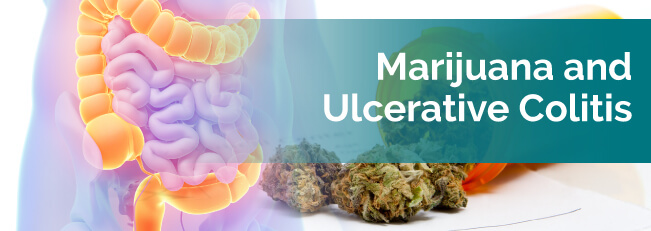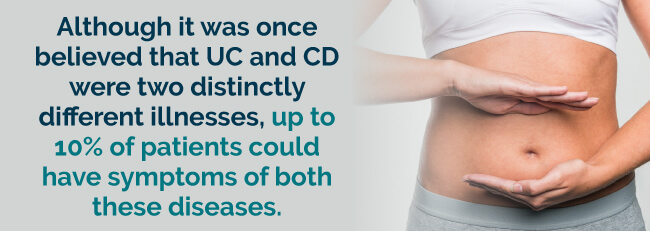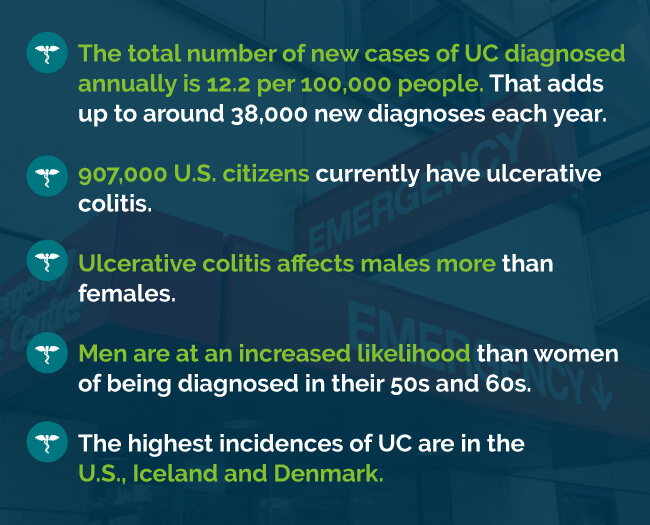
If you or someone close to you have received an ulcerative colitis diagnosis, you probably want to learn as much as you can about it. You’ll be better prepared to manage symptoms and lead a fuller, more comfortable life by having a good understanding of the condition, including your treatment options.
To alleviate your symptoms and to gain control over this condition, you can try various conventional treatments. You may also consider trying medical marijuana. Below, we focus on how using cannabis for ulcerative colitis can improve your quality of life. We also look at the symptoms, history, and range of other treatments for ulcerative colitis.
Ulcerative colitis can be a life-altering and painful condition. You may go through life wondering when and how your condition will flare up and how badly you’ll feel. Conventional treatments often come with a broad range of harmful side effects, as you’ve read above. By using marijuana for ulcerative colitis, on the other hand, you can treat your symptoms effectively with much less dangerous side effects.
Find A Doctor Find A Dispensary
In 2012, The Crohn’s and Colitis Foundation of America released a statement that pointed to compounds in marijuana closely mimicking the endocannabinoids that naturally occur in the human body. These compounds play a crucial part in decreasing gastrointestinal inflammation.

A study from 2011 discovered that 51 percent of ulcerative colitis patients use cannabis to treat their symptoms and have no side effects. There’s also evidence to suggest THC found in medical pot could play a part in reducing the permeability of the epithelial lining, decreasing inflammation, and reducing damage.
Though ulcerative colitis differs from its counterpart Crohn’s Disease, both share symptoms that can be treated using medicinal cannabis. In 2013, a study was conducted testing the effects of medical marijuana on Crohn’s symptoms. Patients were either given medicinal cannabis or a placebo for eight weeks of treatment. Patients who received medical marijuana went into remission and reported increases in appetite and improvements in the quality of their sleep.
Medical pot can treat the inflammation, lack of appetite, general pain, and exhaustion reported by people with ulcerative colitis.
Using medical marijuana for ulcerative colitis could significantly alleviate your symptoms. To qualify for a medical marijuana card, ulcerative colitis must be on your state’s list of qualifying medical marijuana conditions.
Once you have your card, you can visit dispensaries and purchase the products that suit your ulcerative colitis symptom needs. Because a variety of strains exist, speak with an experienced budtender or your marijuana doctor to find ones that will suit you best.
We’ve put together a quick guide to help you get started. Let’s look at Indica, Sativa, and hybrid strains and their medicinal uses.
Indica strains have a sedating effect — you’ll feel a whole-body sensation. These are therefore appropriate for treating symptoms like:
Sativa strains make you feel physically and mentally energetic, as well as clear-headed. Symptoms best treated with sativa strains include:
Hybrid strains have the characteristics of both indica and sativa. For example, adding sativa to an indica strain produces mental clarity and decreases sedative effects. Combining indica with a sativa strain should lower the potential of a pure sativa making you feel anxious.
There’s a lot to learn about the subject of which strain works best for your ulcerative colitis symptoms. We’ve compiled this list to get you started.
Inflammation and pain go hand-in-hand regarding treatment options. Cannabis has potent anti-inflammatory properties. Taking any of the following three strains can alleviate your symptoms:
When you have ulcerative colitis, you need adequate nutrition. Try these strains if you’ve lost your appetite or find eating is painful:
You may frequently feel tired when you have ulcerative colitis. Try the following three strains to combat this:
Now you know how medical pot can help you, let’s look at the methods of marijuana treatment so you can decide which to use to treat your ulcerative colitis symptoms:
The medical community has woken up to the benefits of medical pot in recent years. It no longer has the stigma it once had, and for a good reason. If you or someone you love are seeking a way to naturally and gently relieve your UC symptoms, search for a medical marijuana doctor or dispensary today to find out more about cannabis and ulcerative colitis.
Find A Doctor Find A Dispensary
Ulcerative colitis is also known as UC. It’s one of a group of conditions known as inflammatory bowel diseases. Other illnesses of this type include Crohn’s disease (CD).
Although it was once believed that UC and CD were two distinctly different illnesses, up to 10 percent of patients could have symptoms of both these diseases. Medical experts term having symptoms of both ulcerative colitis and Crohn’s disease as indeterminate colitis.

Inflammation of the lining of the rectum and colon represents hallmark characterization of ulcerative colitis. When your large intestine becomes irritated, it can also become inflamed, leading to symptoms of UC. Although ulcerative colitis always affects the rectum — the lowest area of the large intestine — in some people, it can also impact the entire colon.
Ulcerative colitis results from your immune system responding abnormally. Usually, the proteins and cells that comprise your immune system protect your body from infection. However, when you have ulcerative colitis, your immune system mistakes bacteria, food and anything else in your intestine as an invading substance. Consequently, your body sends white blood cells into your intestinal lining, producing ulcerations and chronic inflammation.
History doesn’t reveal who first described UC. Physicians, like Soranus (A.D. 117) and Aretaeus (A.D. 300), mentioned various types of non-contagious diarrhea in Roman literature. In 1745, Prince Charles, the Young Pretender, had UC and cured himself of the condition by adopting a dairy-free diet.
In 1859, the condition was first referred to by that name by Sir Samuel Wilks. Years later, the Surgeon General of the Union Army also called the disease “ulcerative colitis.” By 1909, London hospitals collated 300 cases of UC. In 1965, Evans and Acheson suggested that the disease affects around one in 1,000 of the general population.
Fifty percent of people with ulcerative colitis experience mild UC symptoms.

Symptoms tend to come and go when you have ulcerative colitis — there can be extended periods of time between flare-ups. You might not feel any discomfort at all during these times. Periods of remission can potentially last for months or even years. Unfortunately, your symptoms may return. Due to these factors, physicians may have a difficult challenge evaluating an effective course of treatment.
According to the Crohn’s and Colitis Foundation of America:

There are three primary goals of medical treatment for ulcerative colitis:
Let’s look at some of the conventional methods of treatment you may encounter.
If you haven’t responded well to medications or you’ve experienced upsetting side effects of those medicines, your physician may recommend removing your large intestine. As with all surgery, potential complications exist, which include post-operative inflammation and the decreased ability to get pregnant naturally.
If you’re concerned about conventional medications or surgery for UC, medical cannabis for ulcerative colitis might help you.
Changes in your diet may help you manage your ulcerative colitis symptoms. Because some foods may make your symptoms worse or cause a flare up, you can use a food diary to track what you’re eating and corresponding symptoms. You may discover that a particular food is causing your UC to flare. Some food alterations that may help include:
Exercising, managing stress, eating smaller meals regularly and drinking plenty of water can help as well.
Ulcerative colitis can make you feel exhausted. You may end up canceling activities you enjoy due to pain and fatigue, or because you’re afraid you won’t make it to a bathroom. You could begin to feel depressed, especially amid a flare-up.
The good news is that you don’t need to put up with your symptoms. Medical cannabis can offer you a lifeline.